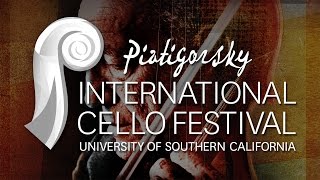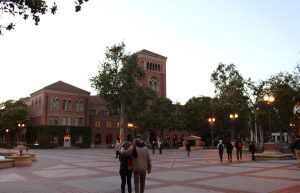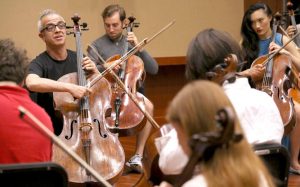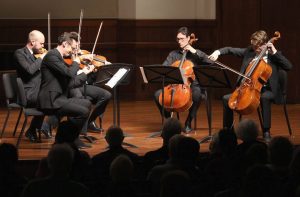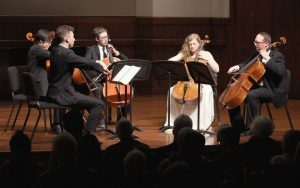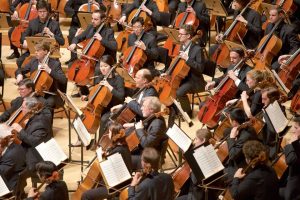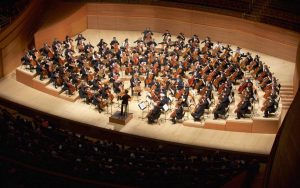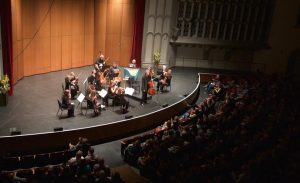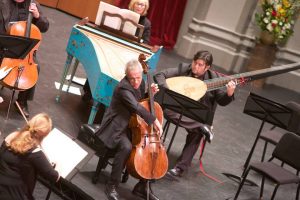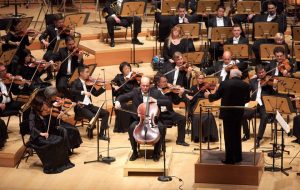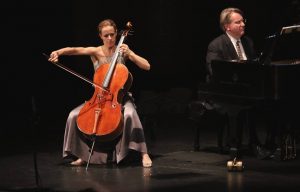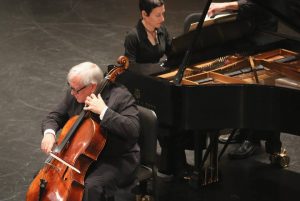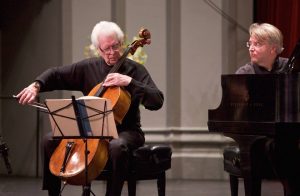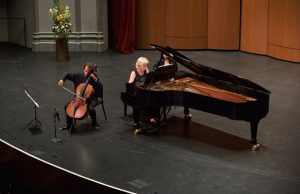A CAVALRY OF CELLISTS
I have covered rock, classical, and musical festivals, so it’s surprising that one of the most satisfying, exciting, and inspirational events I have ever experienced just closed up shop last Sunday after ten days of celebrating the cello. Exhaustive but never enervating, this meticulously planned day-and-night gathering included workshops, master classes, and unforgettable, electrifying performances from the world’s greatest cellists. Many in attendance were already cello enthusiasts and there was a fair amount of USC Thornton School of Music students, faculty, and alumni. Attending the second Piatigorsky International Cello Festival, which ran May 13-22, 2016, would quickly turn anyone into a cello devotee and I am chomping at the bit for the next festival.
Named after the bravura cellist Gregor Piatigorsky, who played a pivotal role in shaping musical culture in Los Angeles–and taught at USC up until his death in 1976–the festival mostly took place on the gorgeous USC campus; some concerts took place at Walt Disney Concert Hall in association with the Los Angeles Philharmonic. The aesthetically pleasing program and its many annotations by Geoff Thomason actually made understanding the music and this instrument a joy. This spoke to an air of acceptance to any patron no matter where he or she lands on the scale of musical knowledge, versus other highfalutin festivals. Certainly, the goal was to applaud, endorse, and learn about all things cello, but I suspect the ultimate desire of the festival’s leaders was to create beautiful music. Check.
In a complete turnabout of my expectations, it was the intimate concerts that stunned. The Calder Quartet, which formed at USC Thornton and performed in four Festival concerts last week, offered as part of the early evening Quintet + Concert series the Boccherini Quintet in C major with one of the most joyous, expressive, spirited players in memory: composer Giovanni Sollima. The Italian cellist exemplified how soulful passion–regardless of how flamboyant–can elicit sounds that make a cello sound as if singing like a human voice. (Sollima also offered a rightfully popular and well-loved workshop during the festival.) His peacockish performance was no doubt infectious as Calder member Eric Byers, playing the other cello part magnificently, beamed as if he were about to break into laughter.
Later, Calder (pictured above) was joined by Antonio Lysy, whose Te Amo, Argentina was the centerpiece of the opening gala concert. At the Alfred Newman Recital Hall, the strings reverberated through the soul as they nailed the throbbing mood of George Onslow’s Double Bass Quintet No. 15 in C minor, Bullet (obviously played here with 2 cellos), written after Onslow was accidentally shot by a. This performance elucidated why it is Onslow’s most performed work, and the players nailed the spirited rhythms and inventive effects.
I was also introduced to an all-cello quintet: SAKURA, named for mentor Ralph Kirshbaum, who is also the festival’s Artistic Director and chair of the strings department at USC (the Japanese “sakura” and German “Kirschbaum” both mean “cherry tree”). The chamber ensemble (above) was a fiery bunch with a muscular sound–aided by youth and enthusiasm–especially with Bizet’s Carmen Fantasy.
Opening a one-night-only concert at Disney Hall was the trailblazing and world-famous Emerson Quartet. But regardless of the acoustics, the venue is simply not suited to chamber music (although piano recitals are terrific here). Joined by Mr. Kirshbaum, the team’s give-and-take was extraordinary during Schubert’s Quintet in C major, but regardless of the lovely lyricism and ability to knock out the work’s constant tonal shifts, the nearly hour-long quintet would have resonated far better at Newman Hall; n this locale, as wonderful as it was executed, it almost became an endurance test.
One of the most anticipated events occurred in the same program: The world premiere of Anna Clyne’s Threads & Traces, for which the festival gathered over 100 cellists (above), making the stage as packed as the house. Sadly, the piece was nowhere near as interesting as the magnificence of conductor Matthew Aucoin, who kept the throng in perfect sync. The work itself was simple, at times sweet, short, and completely underwhelming. Villa-Lobos’s Bachianas Brasileiras No. 1 after the Clyne was achingly beautiful and much more suitable for the humongous ensemble.
The Los Angeles Chamber Orchestra also got on board. As part of its Baroque Conversations series, LACO backed four different cellists in one evening with five concertos from Platti, Vivaldi, Boccherini (above), Leo, and CPE Bach. Everything about this concert was simply correct. Concertmaster Margaret Batjer ensured a tight ensemble as each cellist (Colin Carr, Thomas Demenga, Jean-Guihen Queyras and–pictured above as well–Mr. Sollima) led with understated mastery and virtuosity. Sometimes there isn’t much to say about great classical music concerts. What always impresses is LACO’s sincerity. I value more and more a musical event that knows exactly what it is and simply allows great music to come to life.
Opening the festival was a salute to three major cello works with the Los Angeles Philharmonic. The program began with positively the most rousing rendition of Rossini’s William Tell Overture I have ever heard, thanks wholly to legendary conductor Leonard Slatkin. The finishing piece was Berlioz’s still-fascinating Symphonie Fantastique. Sandwiched in between on the night I attended is the always welcome Elgar Cello Concerto, carried out with elegance and chops by Norwegian Truls Mørk (above). The other nights were Kirshbaum doing Bloch’s Schelomo and Sol Gabetta offering the 1955 version of Martinů’s Cello Concerto No. 1 (which created quite a buzz).
While I missed Gabetta at Disney Hall, the Argentine of French and Russian descent, now settled in Switzerland, appeared later at one of the Evening Recital programs (above). With my favorite pianist of the festival, Kevin Fitz-Gerald, the mesmerizing Gabetta took Chopin’s Grand Duo Concertant and gave it an exquisite rendering full of love and turmoil. But here’s why this festival amazed over and over: just when I thought hers the most stunning performance of the festival, the great David Geringas (who also taught Gabetta) blew us away as he sliced into four pieces in a row, the most thrilling being Schnittke’s Sonata no. 1 with pianist Rina Dokshitsky (below). Then he joined the Calder Quartet for one of the highlights in a week and a half of glorious music-making: Tchaikovsky’s Andante Cantabile.
It was also during an Evening Recital that I got to witness Truls Mørk up close. It’s impossible to encapsulate the smorgasbord of the festival’s brilliant performances in one article, but watching this amazing cellist soloing with pianist Bernadene Blaha on Grieg’s Intermezzo and Sibelius’s Romance and Religioso (and an encore) rejuvenated me as if I spent a week at a spa retreat. Next year can’t come too soon.
photos by Daniel Anderson/USC & Dario Griffin/USC
2016 Piatigorsky International Cello Festival
University of Southern California and Los Angeles Philharmonic
May 13-22, 2016
for more info, visit Piatigorsky Festival, LA Phil, and USC Thornton School of Music
for more info on Mr. Piatigorsky, visit the Colburn School Archives
